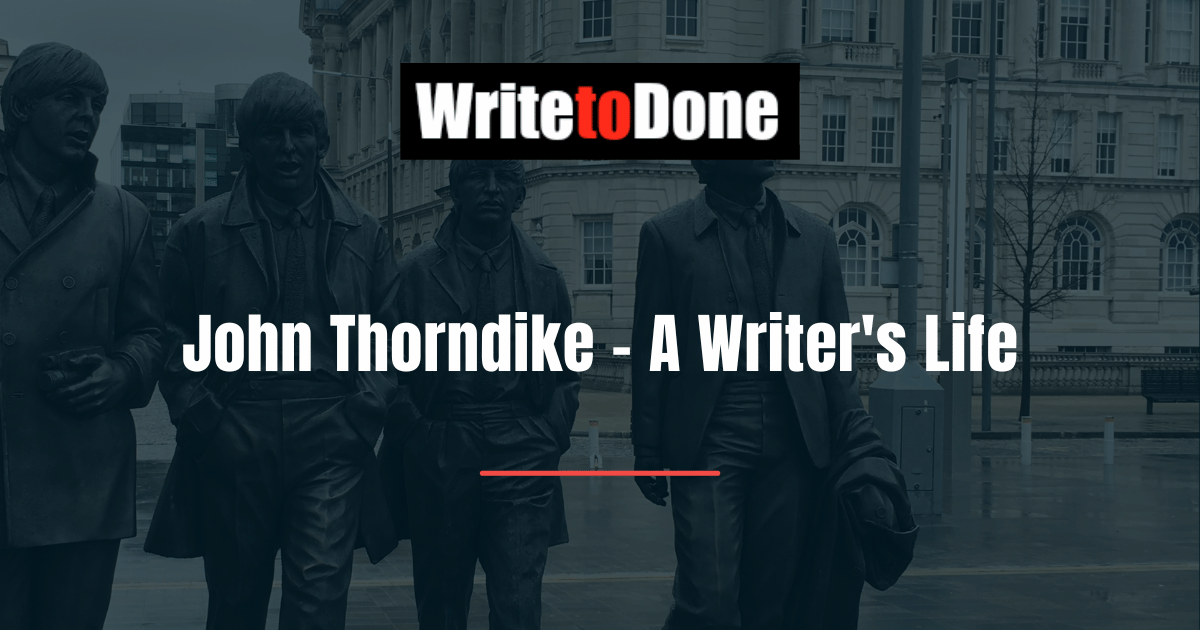Welcome to the third installment in our new series. This week is John Thorndike: A Writer’s Life.
A succession of living writers reveal how they first started writing, how they got published and something of their daily routine. You’ll be inspired, learn powerful tips and gain a strong sense of the writing life that awaits you.
I lit up recently to something the novelist Roger Johns said here on WritetoDone: “It seems that, in my case, stories are more a matter of discovery than of invention. And, as much as I wanted the story to be about the character I had invented, the story itself wanted to be about a character I needed to discover.”
That’s often how it works for me. I start a novel with some idea in mind, some character I want to follow. I write and write, and many of the scenes never make it into the book. But none, I feel, are missteps or a wasted effort. I discover the true story by focusing on all that surrounds it.
In my first drafts, I try to follow Natalie Goldberg’s writing rules from Wild Mind: keep your hand moving, lose control, be specific, go for the jugular, and so on. The trouble is that I start out believing I know who my main character is, and wind up discovering someone entirely new.
After writing a memoir about my father and his descent into Alzheimer’s, I wanted to base my next book on my mother’s life. Though she died many years ago, I was driven to put her story into words. I wanted her inner history to survive. And because I didn’t know enough, especially about her youth, A Hundred Fires in Cuba had to be a novel.
What I didn’t count on was Clare, the woman I created in my mother’s image. When I led her into an affair with one of the actual heroes of the Cuban Revolution, Camilo Cienfuegos, she jumped at the chance, and flung herself into a completely different life, and so became a different person.
Soon I was following Clare into scenes far from my mother’s own experience, and the more I wrote, the further apart the two women grew.
We know a story must follow its own inner logic. On page one that logic might be ours, but with every chapter the characters gather force, and we wind up following their desires, not our own. Such, at least, is the general consensus of how it should work. I subscribe to the idea, but of course not everyone does.
I read with a certain glee Vladimir Nabokov’s comment from a 1967 interview in The Paris Review, when he was asked if his characters sometimes took over and dictated the course of his books. Nabokov would have none of it. “My characters are galley slaves,” he said.
That may have been true for him, but it doesn’t work for me. What I’ve found, in every novel, is that I have to let go of the tiller and row. I cannot take my characters wherever I wish, if that’s not where they want to go.
Happily, I seem to be discovering some middle ground. A Hundred Fires in Cuba did not turn out to be a book about my mother. She inspired it, but Clare flew off into her own political, social, and emotional revolution. Now, in my next novel, I hope to stay much closer to my mother’s actual history—though there’s a limit to this, because of how much was hidden from me as I grew up.
Hence my new rule: Take anything I want from my family history, and invent whatever else I like, as long as it feels true to the story.
Writers have been doing this all along, of course. Consider, most recently, Michael Chabon’s Moonglow, and Karl Ove Knausguard’s My Struggle, family novels which openly meld fact and fiction. By admitting this practice, by claiming it, I think such writers pave the way for the rest of us to feel less constrained about the line between what happened and what we’ve made up.
I’m aware that writing about family may feel more delicate to younger writers than it does to me. Philip Roth is said to have advised the English novelist Ian McEwan, “Write as if your parents were dead.” Both my parents are in fact dead, so I don’t need to worry about their reactions. But the advice rings true.
It doesn’t help a novel or memoir to curtail it so as not to offend. As Anne Lamott said in Bird by Bird, “Just put down on paper everything you can remember now about your parents and siblings and relatives and neighbors, and we will deal with libel later on.”
As a bottom line, let us be true to our story. Not to the one we set out to tell, but to the one that evolves, one that may have been hidden from us when we started to write the book. Indeed, discovering the true story is why I write. I enjoy the craft of writing, and am completely absorbed by it. But at heart, whether I’m writing fiction or memoir, I write to figure out what I know and feel.
When I write, I start to understand.
















